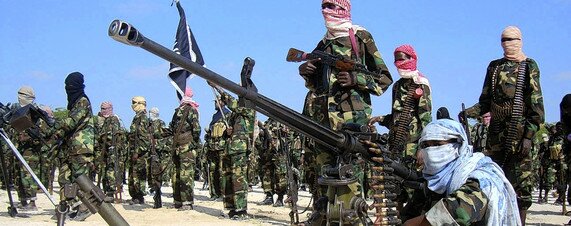Somalia’s Al Shabaab to Ally With Al Qaeda
 NAIROBI, Kenya—The militant group al Shabaab said it would ally with al Qaeda in a drive to establish an Islamic state in Somalia and fight for Muslims across East Africa, offering a fresh test for U.S.-backed African peacekeepers struggling to defend a weak Somali government.
NAIROBI, Kenya—The militant group al Shabaab said it would ally with al Qaeda in a drive to establish an Islamic state in Somalia and fight for Muslims across East Africa, offering a fresh test for U.S.-backed African peacekeepers struggling to defend a weak Somali government.
In a statement Monday, the group said it had agreed, among other things, “to connect the horn of Africa jihad to the one led by al Qaeda and its leader Sheikh Osama Bin Laden.” The statement, written in Somali and Arabic, is believed to be the first explicit confirmation of what U.S. and Somali government have long suspected: Militants in one of Africa’s least stable places are sharing resources and merging agendas.
It isn’t clear whether this new resolution will result in funding or training from al Qaeda, or even if it will lead to an official endorsement from the global terror group. At the very least, the statement signals a tightening embrace with foreign fighters who have been supporting al Shabaab’s efforts to topple the Somali government.
The cooperation also could spur Somali militants to assist al Qaeda elsewhere. Al Shabaab has sent fighters to Afghanistan to train with al Qaeda, according to the Somali government. Al Shabaab recently pledged to send fighters across the Gulf of Aden to Yemen, where al Qaeda is active.
Al Shabaab made its announcement a day after Somali President Sheikh Sharif Sheikh Ahmed marked his first year in office. The past year has offered little respite from the violence that has rocked Somalia for nearly two decades. In the short term, a combined threat is likely to increase pressure on Mr. Sharif’s tenuous government and those trying to stave off its collapse.
The U.S supports Mr. Sharif and is the biggest backer of an African Union peacekeeping mission in Somalia, for which it has provided training and equipment. That support reflects concerns that al Qaeda is attempting to establish a base in Somalia to attack Western targets.
Overall, the Somali government has been frustrated with the lack of foreign support. Thus far, Western donors have provided only a fraction of the $213 million pledged in 2009 to the Somali government and the African Union mission.
A Somali government spokesman declined to comment on the statement from Al Shabaab. An African Union official dismissed the statement as a “non-event,” given that the AU already assumed the two groups were working together.
Still, the announcement shows how the Somali militant group’s identity is evolving, analysts say. Al Shabaab, which already controls much of the country, is increasingly split between Somali nationalists who oppose foreign leadership and want to establish Shariah law in their country, and those who seek a bigger role in the global terror network, these analysts say. Some warn too much foreign influence could backfire.
“The thing that gives Al Shabaab its punch is its national agenda,” said Roger Middleton, an analyst who focuses on the horn of Africa, at London think-tank Chatham House. “That’s key for it, in terms of recruiting and being able to control areas of territory. If they fail to respect that nationalist element of Shabaab, they’re going to be in trouble.”
Al Shabaab has struggled to hold the support of a population wearied by war in part by claiming not to kill civilians. But foreign fighters have introduced more vicious tactics, including suicide bombs and attacks on civilians. After a suicide bombing in December killed at least 19 people, most of them civilians, Somalis took to the streets in protest. Al Shabaab initially denied any involvement. It later admitted the bomber had been an al Shabaab fighter, and a foreigner.
—Abdinasir Mohamed in Mogadishu contributed to this article.
Comments
comments
 Calendar
Calendar




































